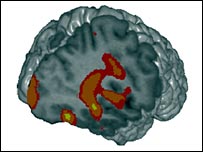Published: February 7, 2008
 Queensland Brain Institute (QBI) scientists have found another important clue to why nerve cells die in neurodegenerative diseases, based on studies of the developing brain.
Queensland Brain Institute (QBI) scientists have found another important clue to why nerve cells die in neurodegenerative diseases, based on studies of the developing brain.
Neuroscientists at The University of Queensland have just published findings, which add more weight to the “use it or lose it” model for brain function.
QBI’s Dr Elizabeth Coulson said a baby’s brain generates roughly double the number of nerve cells it needs to function; with those cells that receive both chemical and electrical stimuli surviving, and the remaining cells dying. [continue reading…]
Published: December 6, 2007
Behavior Control Center in Brain Less Responsive After Repeated Exposure to Violence May Lead to Aggressive BehaviorÂ
Violence is a frequent occurrence in television shows and movies, but can watching it make you behave differently?
Although research has shown some correlation between exposure to media violence and real-life violent behavior, there has been little direct neuroscientific support for this theory until now. [continue reading…]
Published: December 1, 2007
 University of Pittsburgh School of Medicine study reveals new understanding of eating disorders and differences in brain function
University of Pittsburgh School of Medicine study reveals new understanding of eating disorders and differences in brain function
Even after more than a year of maintaining a normalized body weight, young women who recovered from anorexia nervosa show vastly different patterns of brain activity compared to similar women without the eating disorder, [continue reading…]
Published: November 28, 2007
 Pedophilia might be the result of faulty connections in the brain, according to new research released by the Centre for Addiction and Mental Health (CAMH). The study used MRIs and a sophisticated computer analysis technique to compare a group of pedophiles with a group of non-sexual criminals. The pedophiles had significantly less of a substance called “white matter.” which  is responsible for wiring the different parts of the brain together. [continue reading…]
Pedophilia might be the result of faulty connections in the brain, according to new research released by the Centre for Addiction and Mental Health (CAMH). The study used MRIs and a sophisticated computer analysis technique to compare a group of pedophiles with a group of non-sexual criminals. The pedophiles had significantly less of a substance called “white matter.” which  is responsible for wiring the different parts of the brain together. [continue reading…]
 Queensland Brain Institute (QBI) scientists have found another important clue to why nerve cells die in neurodegenerative diseases, based on studies of the developing brain.
Queensland Brain Institute (QBI) scientists have found another important clue to why nerve cells die in neurodegenerative diseases, based on studies of the developing brain.

